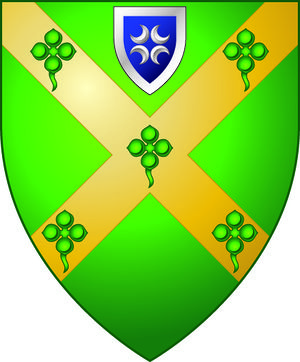Laertes McBride
| Photo | ||||||||||
|---|---|---|---|---|---|---|---|---|---|---|
  Laertes McBride | ||||||||||
| Information | ||||||||||
| ||||||||||
| Heraldry | ||||||||||
 Vert, on a saltire Or five quatrefoils slipped vert and for augmentation, in chief on an escutcheon azure four crescents conjoined in saltire, horns outward, within a bordure argent | ||||||||||
| Help with this sidebar |
Master Laertes McBride (who likes to use the name Laertes Blackavar McBride) is a Companion of the order of the Pelican and a Companion of the White Scarf of Ansteorra. He fights for his lady, Lady Aleksandra Petrovskaia, and has a daughter, Samantha (a/k/a Xena Doombringer). He is a founding member of both the household Laguna House Portos and the fighting unit Portos.
On March 7, 2015, at the Calafia-Gyldenholt Friendship Tourney 2015, he was invited to become one of Caid's first three members of the newly-formed Order of Defense and was elevated on May 2, 2015 at Shire of Darach 40th Anniversary 2015.
Offices & Positions
- Caid Rapier Open Champion 09/1997
- Queen's Rapier Champion - Karina de Elephantide 11/1997-06/1998
- Served as the first Commander of Rapier Army at Estrella 1997-1999
- Caid Rapier Open Champion 09/1998
- Queen's Rapier Champion - Luciana Maria Novella Di Carlo 11/1998-06/1999
- Caid Rapier Open Champion 10/1999
- Queen's Rapier Champion - Battista de Lagos 11/1999-06/2000
- Kingdom Rapier Marshal, Kingdom of Caid, 2000-2002
- Queen's Rapier Champion - Ciar Lasse MacGregor 11/2000-06/2001
- Queen's Rapier Champion - Una Orcadiana 11/2002-06/2003
- Fourth Baron of Altavia with Bridget Lucia Mackenzie, 01/08/2005-05/10/2008
- Queen's Rapier Champion - Adriana von Vogelsang (II) 05/2005-11/2005
- Altavia Rapier Champion, 5/10/08
- Earl Marshal, 9/13/2008-1/8/2011
- Vicar of Altavia with Bridget Lucia Mackenzie, 10/25/2008-05/9/2009
- Companion for Edward II and Mora II, 6/6/2009-11/7/2009
- Altavia Rapier Champion, 5/12/12
- Caid Rapier Open Champion 09/2013
- Altavia Rapier Champion, 5/10/14
- Society Rapier Marshal 1/2013 - 1/2018
- Companion for Agrippa and Bridget, 6/7/2014-11/1/2014
- Liaison for the Order of Defense, 5/2/2015-1/2022
- Companion for Athanaric and Sigriðr, 6/6/2015-1/9/2016
- Altavia Rapier Champion, 5/14/16
- Queen's Rapier Champion - Marisa Rus 07/2016-1/7/2017
- Queen's Rapier Champion - Bridget Lucia Mackenzie (II) 1/14/17-7/15/17
- Kingdom Seneschal - 1/7/23 - Present
Students in Fealty (Provosts to Master Laertes)
- Enid Gwyr (on a sojourn)
- Brig inghean Uateir (Protege)
Classes Taught
- Rapier Combat Marshaling, Collegium Caidis Spring 2001, Collegium Caidis Fall 2001, Collegium Caidis Spring 2002
- Rapier Training, Collegium Caidis Fall 2001, Collegium Caidis Spring 2002, Collegium Caidis Fall 2002
Rapier Teaching Dossier
Questionnaire
Q. What is your style?
A. I'm definitely a "SCA Rapier Combat" fighter. If someone is looking for teaching and training based on period texts and techniques - I'm definitely not the person to approach. While I understand and fully appreciate the forms dictated by period masters, it is not my strength. I became active in the rapier community before the emphasis and accessibility of period texts, and it's tough to teach an old dog old tricks.
Q. Are you more comfortable with beginners, advanced...etc?
I tend to teach less conceptually and more practically-- I'll lay the groundwork of a concept at the beginning of the lesson, then spend the rest of the time on practical execution (foot goes here, pivot your hip like this, move the back foot on the second tempo, etc.) This could be a good or a bad thing, depending on how quickly a newbie gets concepts or how grounded an advanced fighter is in mistaken theory.
I tend to be comfortable teaching any level of fighter. (It's important to remember that we were all a newbie at some point.)
Q. Are you willing to take students?
A. As my current student says, I'm willing to teach anything that holds still long enough. given my responsibilities with my family and work, I need someone that's willing to travel and coordinate event schedules. I'm only able to slice out time at events or pre-existing practices. Separate "one on one" private practices are highly unlikely to happen. I have always been of the mind that one should have only one student at a time. That being said, I'm always open-minded about options.
Q. Are you a tourney teacher or a melee teacher?
I can teach both, but I tend to spend most of my time focusing on the skills that make one a better fighter. The awareness/tactic skills for melee are usually better taught in those environments.
Q. Do you prefer foot work over speed?
A. Probably footwork. My style style capitalizes a lot on speed, but that kind of speed is both built up over time and, to a certain extent, depends on experience and natural ability. One must build the right habits first (especially footwork), then worry about speed.
Q. Are you aggressive in teaching, do you like to watch and critique or fight and critique
A. I'm definitely from the "observe and critique" school. If I notice an issue that can be addressed during sparing, I usually will wait there is a natural break and then go back to revisit it.
Q. Are you uncomfortable teaching females, lefties, tall people, short people, large people, slow people...what do you prefer and who can you offer the most too
A. There are two people that I have difficulty training - those that are here to prove how great they are to everyone else and those that are overly emotionally invested in their performance. Part of combat is understanding how a person's body type will affect their fighting. I strive to take this into account when working with people and adapt techniques to the body type.
Also, people that work with me must be willing to hear behavioral critique. Good manners and chivalry are as important (if not more so) than technique. Someone who wants to learn to clean up tournaments and win championships as fast as possible and not worry about the social/group fun aspect (as opposed to the individual fun aspect) of rapier is not going to do well with me.
Q. Are you approachable, will you make them cry?
A. I try to be blunt and honest when dealing with people. It's only through honestly dealing with problems/weaknesses that things can be improved. Some people can find that off-putting.